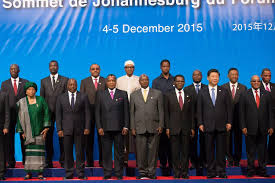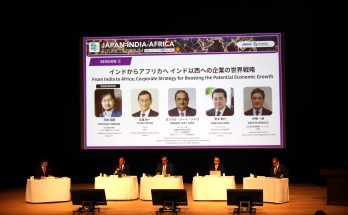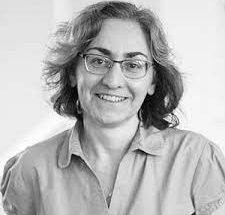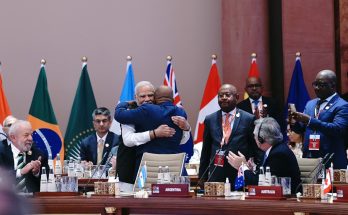The gradual shift of the global economic pole towards South have caused some countries witnessing rapid and sustained growth over a fairly longer period of time during the last decade. These countries attained the status of “emerging economies”. Such a shift also resulted in efforts at building a new development cooperation architecture that led to considerable flow of resources within the Southern countries, particularly post-Busan. The South began looking beyond the North-South Cooperation (NSC) and Triangular Development Cooperation (TDC), which had traditionally been fueled by the Official Development Assistance (ODA) for development cooperation.
Considering the reluctance of the developed world in effecting a needed change in the global financial architecture, the South took initiatives like setting up of the New Development Bank and Asia Infrastructure Investment Bank. The South-South Cooperation (SSC) emerged as a parallel mechanism to support global quest for improved quality of life across the world.
The highly aspirational set of sustainable development goals (SDGs) adopted underscores the global intent to “end poverty, protect the planet and ensure prosperity for all” within a specified timeframe. The African Union too have come out with its Agenda 2063. This has come as a challenge to the Southern countries to bridge the resource gap and achieve these goals. The developed world have always failed in their commitment to finance development activities in the South. The OECD’s latest Development Cooperation Report reveals that the net ODA as percentage of GNI of donor countries declined from 0.3% in 2013 to 0.29% in 2014. The Addis Ababa document, therefore, suggested multi-stakeholder approach to meet the resource gap.
World Situation
The growth in the developed world has remained tardy over the years. The United Nation’s World Economic Situation Prospects-2016 forecasts that the growth in developed economies is expected to continue gaining momentum surpassing 2% for the first time since 2010. However, despite slowdown in China, East and South Asia will remain the world’s fastest-growing regions, with many of the region’s commodity-importing economies benefitting from low prices for oil, metals and food. GDP growth in the least developed countries (LDCs) is expected to rebound from 4.5% in 2015 to 5.6% in 2016, but will fall short of the SDG target of at least 7% GDP growth per annum in the near term. While developing countries have been the locomotive of global growth since the financial crisis, the developed economies, particularly the US, are expected to contribute more to global growth during the forecast period. However, the global economy is projected to grow from 2.4% in 2015 to 2.9% in 2016 and to 3.2% in 2017.
The UN report has projected India to be the world’s fasted growing economy at over 7%. China, which is experiencing a slowdown, has recently scaled down its target for 2016 to 6.5% as against the target of 6.9% fixed for the previous year. In circumstances it has become imperative to re-define South-South Cooperation in the changing global scenario. In view of re-defining the South-South Cooperation, the Research and Information System for Developing Countries (RIS) of India in cooperation with the Ministry for External Affairs is hosting an international conference in New Delhi on March 10-11.
India’s narrative versus others
India’s own narrative of development partnership that includes the compact – capacity building, extending lines of credit, grants, trade and investment – will be discussed. Experiences of the emerging countries like China, Brazil, South Africa will also be discussed. More than 100 eminent speakers from abroad will be participating in this mega event.
One World
India’s vision of ‘one world’ has existed for centuries. In ancient Vedic tradition it is called Vasudhaiva Kutumbakam. It has only attracted greater attention in contemporary times when the world is faced with graver problems such as climate change, environmental pollution, growth in inequality, which require global solutions. However, given the global real politick, it may seem incongruent to assume unilateral pursuance of the idea. In this context SSC stands for human centric development and not economic development alone.
The areas of development to be discussed in the thematic and sectoral framework for SSC includes financing and partnership, peace and security, environment, people-centered development, science and technology and innovation and strat-ups.
Role of Stakeholders
The role of Civil Society Organizations (CSOs) and private sector will also be discussed in details. Due to its vast and diverse spectrum in terms approaches, SSC carries different connotations in different contexts. India’s specific measures provides support for CSOs and private sector to engage with SSC.
Exhibition on South-South Cooperation
Coinciding with Conference, RIS is also organizing an exhibition consisting of 45 stalls in the Charminar Lawn of IHC, which would, inter alia, showcase some important facets of India’s growing international development cooperation programme, in addition to the contribution made by international development assistance agencies in this field. In addition, a cultural programme would also be held on 10 March 2016 at 1900 hrs.
Author Profile
- India Writes Network (www.indiawrites.org) is an emerging think tank and a media-publishing company focused on international affairs & the India Story. Centre for Global India Insights is the research arm of India Writes Network. To subscribe to India and the World, write to editor@indiawrites.org. A venture of TGII Media Private Limited, a leading media, publishing and consultancy company, IWN has carved a niche for balanced and exhaustive reporting and analysis of international affairs. Eminent personalities, politicians, diplomats, authors, strategy gurus and news-makers have contributed to India Writes Network, as also “India and the World,” a magazine focused on global affairs.
Latest entries
 India and the WorldJune 26, 2025Operation Sindoor: India Sheds Restraint, Rediscovers Utility of Force
India and the WorldJune 26, 2025Operation Sindoor: India Sheds Restraint, Rediscovers Utility of Force India and the WorldJune 23, 2025BRICS summit in Rio to focus on Global South, local currency trade
India and the WorldJune 23, 2025BRICS summit in Rio to focus on Global South, local currency trade Africa InsightsJune 11, 2025New Opportunities in India-Japan Cooperation in Africa
Africa InsightsJune 11, 2025New Opportunities in India-Japan Cooperation in Africa India and the WorldMay 23, 2025Post-Operation Sindoor, India reminds Turkey, China of concerns and sensitivities
India and the WorldMay 23, 2025Post-Operation Sindoor, India reminds Turkey, China of concerns and sensitivities








